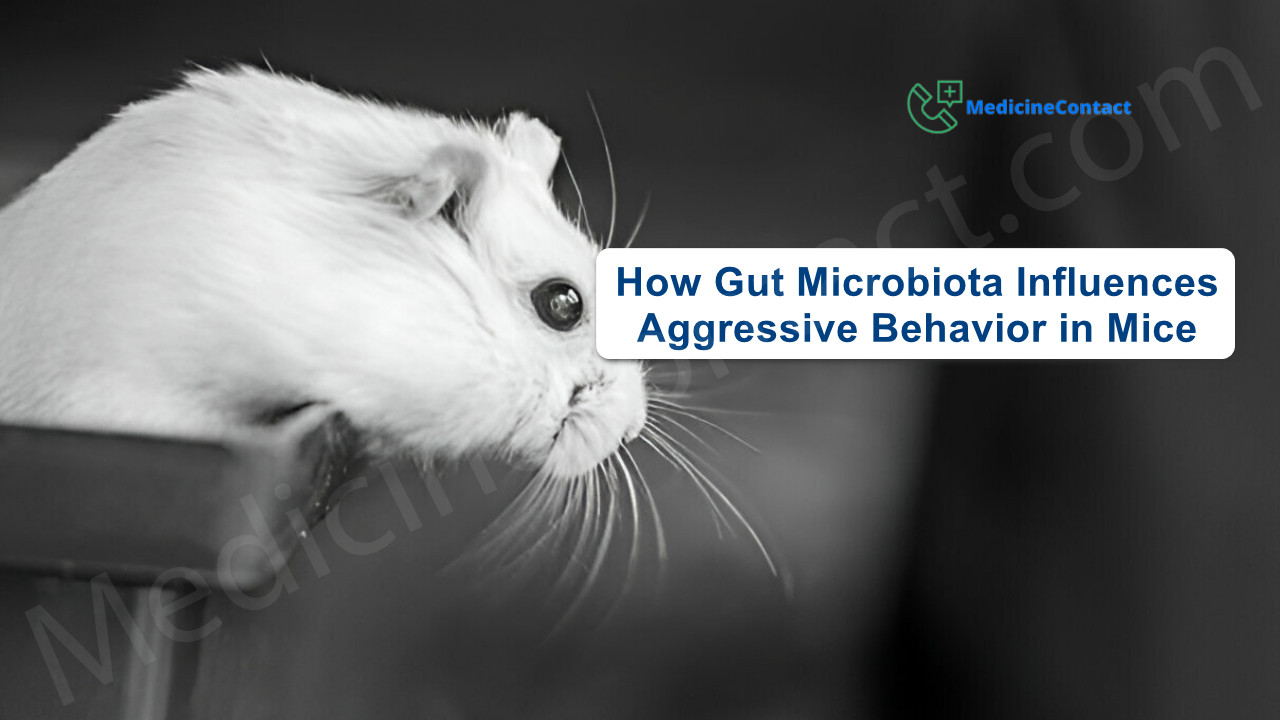
Introduction
In recent years, there's been a lot of interest in understanding how our gut bacteria affect our behavior. Specifically, the link between gut health and aggressive behavior provides interesting insights into both human and animal psychology.
Aggression in Mice as a Model for Human Behavior:
- Mice are crucial models for studying aggression, helping researchers find similarities to human behavior.
- By looking at how things like antibiotic exposure change gut bacteria, scientists can better understand how the digestive system affects aggression.
Significance of Research from Bar-Ilan University:
- Groundbreaking studies from Bar-Ilan University have connected changes in gut bacteria to genes related to aggression.
- These findings show how taking antibiotics early in life can cause long-lasting behavioral changes, including increased aggression.
What Readers Will Gain:
- Insights into how gut health influences aggressive behavior.
- Potential implications for treatment strategies targeting the gut microbiome to manage aggression.
Exploring this line of research not only deepens our understanding of the gut-brain connection but also opens new possibilities for treating behavioral issues through gut health interventions.
Understanding Gut Microbiota
What is Gut Microbiota?
Gut microbiota refers to the diverse community of microorganisms residing in the gastrointestinal tract. These gut bacteria play a crucial role in maintaining overall health by aiding digestion, synthesizing vitamins, and protecting against harmful pathogens.
How a Disrupted Microbiome Affects Our Body
A disrupted microbiome, often caused by factors such as antibiotic exposure or poor diet, can have profound effects on physiological functions. This imbalance can lead to:
- Digestive Issues: Conditions like Irritable Bowel Syndrome (IBS) and Inflammatory Bowel Disease (IBD).
- Immune Dysregulation: Increased susceptibility to infections and autoimmune diseases.
- Mental Health Implications: Emerging research links disrupted gut microbiota to mental health disorders, including anxiety and depression.
The Gut's Role in Mental Health
The gastrointestinal tract, often referred to as the "second brain," has a significant influence on mental well-being. This is primarily mediated through the gut-brain axis—a bidirectional communication system involving neural, hormonal, and immunological pathways.
- Neurotransmitter Production: Gut bacteria are involved in the synthesis of neurotransmitters like serotonin and dopamine, which regulate mood and behavior.
- Inflammatory Response: Dysbiosis can trigger inflammation that impacts brain function and emotional regulation.
- Behavioral Changes: Studies indicate that changes in the gut microbiome can affect behavior, potentially leading to conditions such as increased aggression.
Hormonal Influence of Gut Microbiota
Recent studies have also highlighted the role of gut microbiota in hormone regulation. For instance, certain gut bacteria are known to influence hormonal balance, which can further impact various bodily functions including metabolism, stress response, and reproductive health. Understanding these connections underscores the importance of maintaining a healthy gut microbiota for both physical and mental health.
The Gut-Brain Axis Connection
Understanding the gut-brain axis sheds light on how gut microbiota can influence behavior regulation. This complex communication network links the gastrointestinal tract with the central nervous system, facilitating a two-way flow of information.
How Gut Bacteria Influence Neurotransmitter Levels
Gut bacteria play a crucial role in modulating neurotransmitter levels, which directly affect behaviors such as aggression. Key neurotransmitters impacted by gut microbiota include:
- Serotonin: Often referred to as the "feel-good" neurotransmitter, serotonin is known for its role in mood regulation. Approximately 90% of serotonin is produced in the gut. Disruptions in gut microbiota can lead to altered serotonin levels, which may contribute to aggressive behavior.
- Tryptophan: This essential amino acid is a precursor to serotonin. Gut bacteria are involved in the metabolism of tryptophan, influencing its availability and conversion to serotonin.
Psychological Perspectives on Behavior Regulation
Behavioral changes influenced by gut microbiota align with several psychological theories:
- Operant Conditioning: This theory suggests that behavior is shaped by rewards and punishments. Changes in neurotransmitter levels due to gut health could alter responses to these stimuli.
- Observational Learning: An example is seen when Dymesha watches her older sister perform headstands and learns through observation. This type of learning involves cognitive processes that could be affected by changes in brain chemistry linked to gut health.
The intricate relationship between gut bacteria and neurotransmitters underscores the importance of maintaining a healthy microbiome for optimal mental well-being and behavioral regulation. Insights from this connection can pave the way for innovative treatment strategies targeting both gut and mental health.
Aggression in Mice Models: A Closer Look at Bar-Ilan University's Research
Using Mouse Models to Study Aggression
Mouse models have been instrumental in studying aggression due to their genetic similarity to humans and their well-documented behavioral patterns. One widely used technique is the resident-intruder paradigm. In this setup, a resident mouse is introduced to an intruder mouse in its home cage, allowing researchers to observe and measure aggressive behaviors such as biting, chasing, and fighting.
This method provides a controlled environment to study the aggression-related genes and the influence of various factors on aggressive behavior. Such studies are crucial for understanding how specific genes and environmental conditions contribute to aggression.
Key Findings from Bar-Ilan University
Bar-Ilan University's pioneering research has shed light on the intricate relationship between gut microbiota and aggression in mice. Some of the significant discoveries include:
- Impact of Antibiotics: Administration of low-dose antibiotics during early life stages drastically alters the gut microbiome's composition. This leads to a reduction in bacterial diversity, which correlates with increased aggression.
- Behavioral Changes: The antibiotic-treated mice exhibited not only heightened aggression but also impairments in anxiety-like behaviors and social interactions. These changes were linked to alterations in brain cytokines and neurotransmitter levels.
- Experimental Models: Researchers utilized both germ-free mice and mice with humanized gut microbiomes to study aggression-related outcomes following microbiome disruption. These models help isolate the effects of gut bacteria on behavior.
- Metabolite Changes: Aggressive mice showed significant changes in metabolites associated with neurotransmission. This suggests that biochemical pathways influenced by gut microbiota play a critical role in modulating aggressive behavior.
These findings underscore the importance of maintaining a healthy gut microbiome for behavioral regulation. They also highlight potential intervention strategies involving probiotics or dietary changes to manage aggression effectively.
The research from Bar-Ilan University opens new avenues for understanding how gut health can impact behavior and offers promising insights into potential treatments for aggression-related issues.
How Gut Microbiota Affects Aggression in Mice: Insights from Bar-Ilan University
Understanding how gut microbiota affects aggression in mice shows the important roles of serotonin and tryptophan. These neurotransmitters are crucial for controlling mood and behavior. Changes in the gut microbiome, like those caused by antibiotics, can greatly impact their levels.
The Role of Serotonin
Serotonin is mainly produced in the digestive system, with gut bacteria being key to its creation. Changes in gut microbiota can lower serotonin levels, leading to more aggression. This emphasizes the need for a healthy gut to support good brain function.
The Importance of Tryptophan
Tryptophan, an amino acid needed for making serotonin, is also important. Gut bacteria affect how tryptophan is processed, which influences its availability for serotonin production. Disrupted microbiota can change this process, further affecting serotonin levels and aggressive behavior.
Key Findings from Bar-Ilan University
Research from Bar-Ilan University highlights these connections:
- Antibiotic Exposure: Early-life exposure to antibiotics disrupts gut microbiota composition, leading to decreased bacterial diversity.
- Neurotransmitter Changes: This imbalance correlates with altered brain chemicals and neurotransmitter levels, including serotonin and tryptophan.
- Behavioral Outcomes: Mice with disrupted gut microbiota show more aggression, along with changes in anxiety-like and social behaviors.
Potential Interventions
Understanding these biochemical pathways offers insights into potential interventions:
- Probiotics
- Dietary changes
These could restore gut health, balance neurotransmitter levels, and reduce aggressive behaviors. The complex relationship between gut microbiota and brain function highlights the importance of maintaining a healthy digestive system for controlling behavior.
Using Gut Microbiota to Manage Aggression: Clinical Applications and Future Research
Understanding the complex connection between gut microbiota and aggression opens up exciting possibilities for clinical applications. One potential solution is using probiotics. Probiotics can help restore a healthy balance of gut bacteria, potentially reducing aggressive behaviors by stabilizing neurotransmitter levels and decreasing inflammation.
Key Strategies for Intervention:
- Dietary Changes: Adding foods rich in prebiotics and probiotics, like yogurt and fermented vegetables, can create a healthier gut environment.
- Probiotic Supplements: Developing specific strains of probiotics that target the gut-brain axis more effectively could help regulate mood and behavior.
- Early Interventions: Focusing on gut health from an early age may prevent disruptions caused by antibiotics or poor diet, lowering the risk of aggression later in life.
The Role of Psychotherapy:
Psychological approaches can also benefit from these findings. According to psychologists, classical conditioning works because individuals or animals can predict the relationship between the unconditioned stimulus (UCS) and the conditioned stimulus (CS). Combining this understanding with gut health interventions may improve therapeutic outcomes for those displaying aggressive behavior.
Future Research Directions:
Research continues to explore how specific bacterial strains influence behavior. Long-term studies are essential to understand how early-life interventions can have lasting effects on aggression. Additionally, expanding research to human models will provide deeper insights into how these findings can translate into practical treatments for behavioral disorders linked to gut microbiota.
By using these insights, future treatments may not only address symptoms but also offer preventative strategies through maintaining optimal gut health.
Conclusion: The Intriguing Link Between Gut Microbiota and Aggressive Behavior in Mice Models - What Lies Ahead?
Understanding the complex relationship between gut microbiota and aggressive behavior in mice provides valuable insights with significant implications for human behavior. Emphasizing the importance of gut health, particularly how a balanced microbiome influences behavioral outcomes, becomes crucial.
Key Takeaways:
- Importance of Gut Health: Maintaining a healthy gut microbiome can be pivotal in managing aggression and other behavioral issues.
- Future Research Directions: Exploring new dimensions in this field can lead to innovative treatment strategies, including dietary interventions and probiotics.
- Behavioral Reinforcement: Just as various reinforcement schedules like fixed ratio or vicarious reinforcement shape behaviors in psychological studies, maintaining gut health might similarly influence behavioral patterns.
Research from Bar-Ilan University underscores this connection, highlighting how disruptions caused by antibiotics can lead to increased aggression. Such findings pave the way for future studies aimed at unraveling more about the gut-brain axis and its profound impact on behavior.
FAQs (Frequently Asked Questions)
What is the relationship between gut microbiota and aggressive behavior?
Research indicates that gut microbiota plays a significant role in influencing behavior, including aggression. Disruptions in gut bacteria can affect neurotransmitter levels, such as serotonin and tryptophan, which are linked to aggressive behaviors.
Why are mice used as models for studying aggression?
Mice are commonly used in research to study aggression due to their genetic similarities to humans and the ability to control environmental factors. The resident-intruder paradigm is often employed to observe aggressive behaviors in these models.
What findings have emerged from Bar-Ilan University's research on aggression-related genes?
Bar-Ilan University's research has identified key aggression-related genes that interact with gut microbiota and environmental factors, such as antibiotic exposure, highlighting the complex relationship between genetics, gut health, and behavior.
How does the gut-brain axis influence behavior regulation?
The gut-brain axis refers to the bidirectional communication between the gastrointestinal tract and the brain. Gut bacteria can influence neurotransmitter production, affecting mood and behavior, including aggression.
What clinical applications could arise from understanding the microbiome-aggression relationship?
Potential clinical applications include using probiotics and dietary modifications as intervention strategies to improve gut health. These approaches may help mitigate aggressive behavior by restoring a balanced microbiome.
What future research directions are suggested regarding gut health and aggression?
Future research should continue exploring the link between gut microbiota and behavioral outcomes. Investigating how maintaining gut health can influence aggressive behavior will be crucial for developing effective interventions.
Disclaimer: This article is for informational purposes only and does not constitute medical advice. Always consult with a healthcare professional before starting any new treatment regimen.



